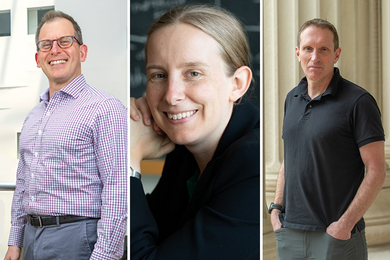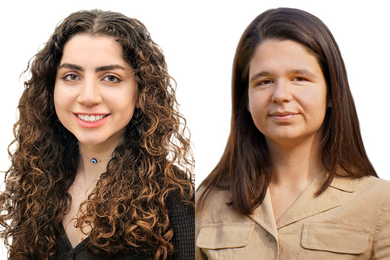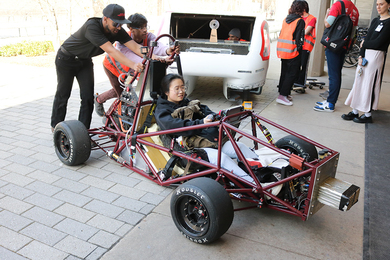Sit down with Maria Jesus Saenz of the MIT Center for Transportation and Logistics (CTL) to discuss her professional achievements and priorities, and you’re likely to come away with two questions: How has she become a thought leader in so many areas — from logistics strategies and supply chain education to human-AI collaboration and digital supply chain transformation, to name just a few? And what is behind her legendary energy and drive?
The answer to both questions is passion — for excellence, for teaching, and for applied research that has a practical, beneficial impact on both businesses and people.
Saenz, who is executive director of MIT’s Supply Chain Management master’s programs and director of the MIT Digital Supply Chain Transformation Lab, did not start out in supply chain management. Her master’s and doctoral degrees, from the University of Zaragoza in her native Spain, are in industrial engineering and manufacturing and design engineering, respectively. But when, as a newly tenured professor more than two decades ago, she was invited to teach a course on logistics, she took a chance and said yes. “I thought, this sounds interesting and impactful on operations,” she recalls. Her doctoral research had focused on how organizations collaborate, “so this was familiar for me, because logistics is about collaboration.”
That assignment proved to be a gateway to the broader field of supply chain management (SCM) — managing the complex, global webs of product design, manufacturing, inventory, warehousing, inbound and outbound logistics, and returns activities that underpin everything we use or consume. Whether in teaching, applied research, or as a strategic advisor for startups, Saenz’s desire to explore new ways to apply her analytical and statistical expertise as well as technologies like artificial intelligence and machine learning to digital transformation has guided her professional path ever since.
In 2018, after 14 years as a professor and then director of the Zaragoza Logistics Center, part of the MIT Global Supply Chain and Logistics Excellence (SCALE) Network, Saenz made the leap across the Atlantic to Cambridge, Massachusetts. Why leave sunny Spain for the muddy banks of the Charles? “I came to MIT CTL because it’s a place to do applied research that is hands-on,” she says, adding that she enjoys helping companies solve complex problems by applying different disciplines and methodologies in a way that takes human elements into account. “To understand and improve a supply chain requires a combination of quantitative analysis, for things like risk management and demand forecasting, together with behavioral and organizational phenomena. This is what I really like.”
At MIT, Saenz’s priorities and initiatives are numerous and diverse, but they all have something in common: they aim to equip students with the knowledge and skills they will need to navigate the complexities of modern global supply chains.
For example, Saenz has long fostered collaborations between academia and industry, guiding researchers and students as they contribute to significant efficiency improvements, cost reductions, and enhanced customer experiences for supply chain organizations worldwide. She has also introduced innovative enhancements to MIT’s supply chain management curriculum, including the integration of the strategy behind emerging technologies like AI and the expansion of analytics courses and program components. These updates help students develop the critical competencies they will need to succeed in a rapidly changing, global business environment.
Leading the way for women in supply chain management
Saenz’s work has long been recognized in the academic community, but now it is gaining more attention among supply chain practitioners. In September she was named a recipient of the 2023 Women in Supply Chain Award by the industry publications Food Logistics and Supply and Demand Chain Executive. This award acknowledges both her many professional achievements and her commitment to mentoring and setting an example for other women in supply chain management.
Saenz is actively involved in professional organizations that encourage women to enter the field, excel in their careers, and advance to leadership positions. Most notable among them is AWESOME (Achieving Women’s Excellence in Supply Chain Operations, Management, and Education), an organization that supports the professional development of women supply chain leaders. The group sponsors the AWESOME/MIT Advancing Women through Education fellowships (2023 recipients of which were recently announced) for women in CTL’s Supply Chain Management master’s programs. “It is important for students to be surrounded by strong women leaders empowering young professionals in the supportive community” that AWESOME provides, Saenz says. Another example is the Council of Supply Chain Management Professionals, a global organization that focuses on supply chain education and professional development.
Technical knowledge and skills are foundational for success, of course, but Saenz also gives great weight to preparing students of all genders to lead supply chain organizations. “I want to make sure students who have the potential for leadership have opportunities to develop themselves,” she says. Sometimes, she adds, students may not recognize their own potential yet, and they need encouragement and mentoring to discover their leadership capabilities.
Becoming a leader, though, requires more than knowledge, skills, and a desire to be a decision-maker. It also takes a willingness to learn and to question conventional wisdom. “I emphasize to students that they have to be comfortable with challenging others’ ideas, and to be confident when others challenge their ideas,” Saenz says. “At MIT, we love challenging ideas. It’s not that we challenge people; we challenge ideas so we can take them, together with our collective capabilities, to the next level.” She also encourages students to apply a creative, “entrepreneurial spirit” to their assignments and thinking.
Add in their classroom learning, case studies, and experience of working on data-driven challenges in addition to a practical capstone project, plus exposure to visiting speakers who are supply chain leaders themselves — including women who serve as inspiring examples for early-career women in the SCM program, Saenz notes, and students become “comfortable experimenting with challenging ideas.”









